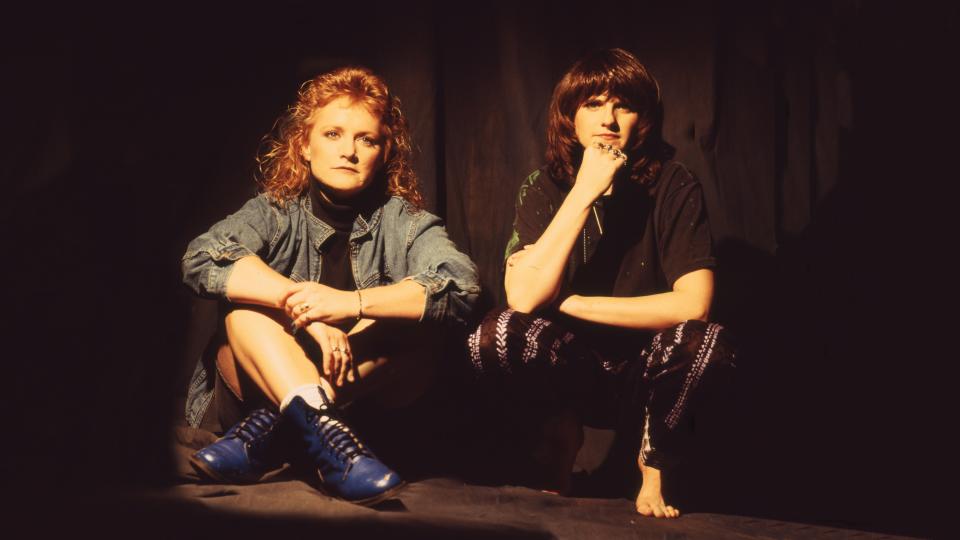New, critically-acclaimed Indigo Girls doc premieres at Nashville's Belcourt Theater
- Oops!Something went wrong.Please try again later.
Documentary filmmaker Alexandria Bombach's acclaimed Indigo Girls documentary retrospective "It's Only Life After All" plays Nashville's Belcourt Theater on April 15, 2024, at 2:40 p.m., 5:15 p.m. and 8:00 p.m.
Tickets are between $11.50-$13.50 and are currently available via https://www.belcourt.org/films/indigo-girls-its-only-life-after-all/.
The film comes four decades after Amy Ray and Emily Saliers—Atlanta-born friends since childhood and creative collaborators since their teenage years—asked the question of how close we, as a society, were to satisfying our collective insatiable hunger for self-knowledge. Highlighting their work as folk rockers and social activists, it shows how some are more aware of the value, if perhaps not closer, to that goal than ever before.
The era in which the Indigo Girls initially achieved musical mainstream renown via their 1989 hit "Closer To Fine" was one wherein artists like Bonnie Raitt, Linda Ronstadt, Dolly Parton and Emmylou Harris shared renown with Suzanne Vega, K.T. Oslin, Sinéad O'Connor, Melissa Etheridge and Tracy Chapman.
Bombach describes The Indigo Girls to The Tennessean as essential leaders of the progressive edge of a movement driven by "earnest, honest and personal" songwriting of uncensored lyrical narratives creating a "contagious" and unprecedented visibility and voice to populations—namely those of female, queer and marginalized populations—worldwide.
'It's not just about us'
For five years, the Independent Spirit Award filmmaker chronicled and researched the life and times of Ray and Saliers—she's been a fan of their music since she was a teenager.
Bombach adds that she recollects Ray speaking to people during the downtimes in filming and being almost embarrassed by the commotion surrounding her and Saliers, noting, "It's not just about us."
However, what the director describes as generations of people learning how to live profound and impactful lives by having an "osmosis"-driven connection to the Indigo Girls' catalog and work creates a different level of connectivity and fandom.
In Bombach's director's statement, she describes how The Indigo Girls' music literally saved the lives of marginalized people by creating communities that allowed for safe, empathetic spaces to exist on both sides of emotional, physical and social struggles.
Continuing, she notes that she deeply values how forthcoming the duo were about the obstacles they faced in creating such a community during an early 90s era where they shattered the female pop star mold by being one of very few out, queer and vibrantly political musical acts in the global mainstream.
"It's Only Life After All" successfully presents The Indigo Girls as bridge-builders to a modern era where queer liberation is still troublesome to many but much more widely accepted.
'authentically true to themselves'
Forty years of rare and often unseen home movies and film archives are paired with concert footage and emotional interviews to highlight how well—or sometimes not so well—they followed in the hard-won path to sustainability that legendary performers must craft before their rise to fame.
Five albums into their mainstream careers and after the success of their first top-10 alternative radio single, "Galileo," the Indigo Girls met Indigenous activist Winona LaDuke. From that point forward, supporting grassroots activism and speaking out against social and environmental injustice became essential to their lives.
"They had a non-negotiable desire to remain, regardless of how it impacted their commercial popularity, artists willing to speak out about and engage their fanbase—and the world—in critical conversations. Remaining authentically true to themselves, their communities and their families still remains a priority for (Amy and Emily)."
Between 2000 and 2010, the Indigo Girls did not chart a top 10 album or single. However, they helped develop the Honor The Earth Tour, which visits colleges and Native communities and raises money for the non-profit of the same name. As well in 2006, they were featured on P!nk's song "Dear Mr. President," which, in an interview, she noted, was "a political confrontation with George W. Bush about war, poverty, LGBT rights, abortion rights, and the No Child Left Behind Act."
They also engaged in performances supporting initiatives, including the Human Rights Campaign and March for Women's Lives, among many causes.
'we're not alone'
The documentary showcases more of the Indigo Girls as meeting, speaking and working as activists than it shows them in concert as musicians.
The choice is intentional.
Filming of the documentary intersected with the first COVID-19 quarantine, the post-vaccine mask mandate era and the Black Lives Matter movement that surged between those tent-post dates.
"In a disheartening time in the world, watching Amy and Emily, along with the Indigenous women with whom they share community, engaging in dedicated grassroots activism was meaningful," says Bombach.

Extrapolate that notion to director Greta Gerwig choosing "Closer To Fine" to soundtrack elements of her 2023 "Barbie" film. Bombach enjoyed how the film utilized the song as a story-arcing device that built upon the Indigo Girls' desire to take their fans on a timeless journey to discovering life's right answers.
"The Indigo Girls are uniquely both a part of music and queer history and are (eternally) deserving of gratitude for their work," states Bombach about her documentary work in full.
"(The Indigo Girls) are still writing songs and selling out shows—still activists, staying true to themselves," she says. "In this film, Amy and Emily look back at the failings, lessons, hilarity, and pain that got them here. I know for many, it will be a gift to hear these stories—a gift to know we're not alone."
This article originally appeared on Nashville Tennessean: New, critically-acclaimed Indigo Girls doc premieres at Nashville's Belcourt Theater

